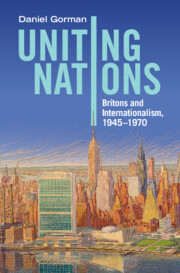Britain and the Intellectual Origins of the League of Nations, 1914–1919
£22.99
- Author: Sakiko Kaiga, University of Tokyo
- Date Published: December 2022
- availability: Available
- format: Paperback
- isbn: 9781108733540
£
22.99
Paperback
Other available formats:
Hardback, eBook
Looking for an inspection copy?
This title is not currently available on inspection
-
In this innovative account of the origins of the idea of the League of Nations, Sakiko Kaiga casts new light on the pro-League of Nations movement in Britain in the era of the First World War, revealing its unexpected consequences for the development of the first international organisation for peace. Combining international, social, intellectual history and international relations, she challenges two misunderstandings about the role of the movement: that their ideas about a league were utopian and that its peaceful ideal appealed to the war-weary public. Kaiga demonstrates how the original post-war plan consisted of both realistic and idealistic views of international relations, and shows how it evolved and changed in tandem with the war. She provides a comprehensive analysis of the unknown origins of the League of Nations and highlights the transformation of international society and of ideas about war prevention in the twentieth century to the present.
Read more- Reveals how the first international organisation for peace was planned, and how it influenced the present international system
- Traces how ideas about the post-war order were discussed and elaborated inside groups such as the Bryce Group and the League of Nations Society
- Incorporates intellectual, social and political history as well as international relations
Awards
- Winner, 2023 Scott Bills Memorial Prize in Peace History, Peace History Society
Reviews & endorsements
'This book reveals the complex intellectual foundations of the league of nations movement in Britain, offering a novel and sustained comparison between British and US views, and how the call for new world organization ties into the wider social history of the First World War.' Patricia Clavin, University of Oxford
See more reviews'An exciting analysis of the British thinkers who were among the most important originators of the League of Nations, and how they failed to resolve an issue as acute today as in 1918: how to avoid war without using war. A remarkable first book.' John Horne, Emeritus Professor of History, Trinity College Dublin
'Sakiko Kaiga offers an excellent study of 'liberal internationalism' in Britain before and during the Great War. By examining not only publications by Britain's internationalists but also private correspondence among them, the author sheds much fresh light on the limits as well as the promise of an internationalism that existed side by side with imperialism.' Akira Iriye, Emeritus Professor of History, Harvard University
'Sakiko Kaiga's Britain and the Intellectual Origins of the League of Nations, 1914–1919 is an attempt … to highlight the ideational currents that fed into that consequential moment in the spring of 1919, … it adds new and welcome detail concerning the work of key individuals and organizations in that history.' Andrew Ehrhardt, International Affairs
'The narrative is based on detailed and careful archival research throughout … the exceptionally rich, archivally informed narrative … makes this volume essential reading for those interested in discovering more about a key component of the British intellectual roots of the League of Nations.' Thomas Davies, Journal of British Studies
Customer reviews
Not yet reviewed
Be the first to review
Review was not posted due to profanity
×Product details
- Date Published: December 2022
- format: Paperback
- isbn: 9781108733540
- length: 232 pages
- dimensions: 228 x 151 x 12 mm
- weight: 0.35kg
- availability: Available
Table of Contents
Introduction
1. Precursors: Thinking about War and Peace before 1914
2. The Use of Force to Prevent War? The Bryce Group's Proposals for the Avoidance of War, 1914-15
3. Strategies for Winning Public Opinion: The Success and the Loss of the League of Nations Society, 1915-17
4. A Transnational Movement? The British and American Pro-League of Nations Groups, 1914-18
5. No Peace without Victory: The League of Victorious Allies, 1917-18
Conclusion.
Sorry, this resource is locked
Please register or sign in to request access. If you are having problems accessing these resources please email [email protected]
Register Sign in» Proceed
You are now leaving the Cambridge University Press website. Your eBook purchase and download will be completed by our partner www.ebooks.com. Please see the permission section of the www.ebooks.com catalogue page for details of the print & copy limits on our eBooks.
Continue ×Are you sure you want to delete your account?
This cannot be undone.
Thank you for your feedback which will help us improve our service.
If you requested a response, we will make sure to get back to you shortly.
×




